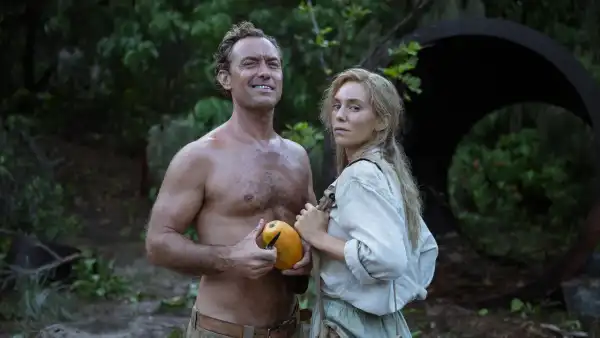
The new film Eden is full of anger, uncontrollable sexuality, terrifying acts of violence and nihilistic views – all of which are clearly not in the style of Ron Howard, a director whose style sometimes borders on absurd cheerfulness. However, taken literally, the film can be seen as just another of his voyages to distant geographical and historical lands. Based on a series of mysterious disappearances that took place almost a century ago on a harsh Galapagos island, the film adds another foray into the world of real, distant danger to his filmography – a creation that takes its rightful place next to Apollo 13 (1995), In the Heart of the Sea (2015) and Thirteen Lives (2022). Dare we include the much-maligned Hillbilly Elegy (2020), which offered a radically different perspective on overcoming adversity—and a timid, almost exotic look at the deprivation and brutality of J.D. Vance’s Rust Belt childhood? Eden is at times vulgar, but at least it offers a respite from all that. If I were accused of being involved in Vance’s rise, I, too, would be racing to the equator.
At least four inhabitants of the Galapagos island of Floreana disappeared or died in the early 1930s, in circumstances later hotly disputed by survivors. The 2014 film The Galapagos Affair: Satan Came to Eden painstakingly reconstructed the characters’ written records, allowing the settlers to speak in their own, often contradictory, words. Eden, starring Noah Pink (Tetris), opens in 1929, the era of the Great Depression and the re-examination of fundamental principles. Floreana soon welcomes its first inhabitants in a long time: a stern German couple of ascetic theologians: Dr. Friedrich Ritter, a physician-turned-philosopher, and his patient and companion, Dora Strauch, who have fled what they believe is the moral and spiritual (not to mention material) collapse of civilization.
Friedrich and Dora are played by Jude Law and Vanessa Kirby, whose tanned, dirt-covered faces nevertheless exude the glossy self-confidence of movie idols. And why not? The pair of Floreana pioneers are perhaps not socialites, but they are persons of world significance. Friedrich’s messages, picked up by raiding ships, are eagerly published by European newspapers, soon spreading news of the duo’s lifestyle: crops, a valuable donkey, chickens, and an economical shower that thriftily spends the island’s meager water supplies. But while they are ardent adherents of isolation, they are also possessed by revolutionary ambitions on a universal scale. Friedrich writes a treatise that, in his calculations, is called upon to break the course of humanity, although what is revealed to us resembles a crude reinterpretation of Nietzsche. The couple also hope that the island's air masses will have a healing effect on Dora, who suffers from multiple sclerosis.
Dora is not the only newcomer hoping to find health on Floreana. In the winter of 1932, another German couple, Heinz Wittmer (Daniel Bruhl) and his young wife Margrethe (Sydney Sweeney), come ashore, along with Heinz's son from a previous marriage, Harry (Jonathan Tittel), who is recovering from tuberculosis. The Wittmers are businesslike, hospitable people who try to win over the old-timers. However, the reception boils down to barely concealed hostility. Instead of hospitality, Friedrich moves them to remote grottoes, expecting that the obstacles of island reality – the sweltering heat, tropical rains, annoying midges, ferocious dogs – will soon drive them away. He is wrong. Heinz and Margrethe demonstrate abilities that are more impressive than their Ned Flanders-on-safari good looks, and certainly more sympathetic than the next batch of natives that descends on their shores. Enter an aristocratic vampire from Austria (Ana de Armas, to be precise), calling herself Baroness Eloise Verborn de Wagner-Bosquet, a title that is difficult to pronounce, and if you are confused about its pronunciation, de Armas's sly accent will not serve as a yardstick.
The baroness has phantasmagorical plans for a luxury hotel on Floreana and has brought along a pair of designated attendants, engineer Rudi Lorenz (Felix Kammerer) and bodyguard Robert Phillipson (Toby Wallace), to give her meticulous advice on the matter. Much of the consultation takes place in the shadow of a tent, from which thunderous cries of delight can be heard for miles around. In an effort to keep up, Friedrich leads a mysteriously flamboyant sex life with Dora and indulges in exhibitionist realities, while he treats the baroness to what can only be called a militant sortie. The viewer may conjure up images of young Law from The Talented Mr. Ripley (1999), reclining on a beach chair as a blond snob’s dream come true. Walking around in the costume of Adam in “Eden”, Law is old and unwashed today, but that thin crown of arrogance has not deserted him; on the contrary, one gets the feeling that it has become aggravated, dried up and rotted under the fierce equatorial sun.
At times, Eden feels like a cynical retelling of Aesop's fables. The Wittmers are resourceful, tireless ants: the world gives way to them, and they end up with a cozy house, a garden, a water tank, a cow, and, against all odds, a breasty male infant. (As the meek, patient Margrethe, Sweeney gives a full-blown performance in the film, especially in a childbirth scene of absurd, frighteningly wild expression.) The Baroness is a grasshopper, though she is not a parasite but a predator; deprived of provisions, she one day orders her burly hangers-on to rob the Wittmers' cellar, seizing their supplies in tin cans. Friedrich and Dora are more reminiscent of the third type of arthropod, the poisonous centipede monster introduced in the opening of the film. Dora calls it a “Goliath” – as Darwin named the species – and predicts to Margret: “Its bite is deadly.” Then, purring blissfully, she adds: “On this island, anyone can kill you.”
But who will fall, and from what, in the finale? This intrigue keeps you watching, even as the film sinks deeper into an expensive production homage to Lord of the Flies. Despite its title, Eden is a drama about paradise lost. (The reference to Genesis dates back to at least 1931, when one of Ritter’s analyses appeared in The Atlantic under the heading “Adam and Eve in the Galapagos.”) In my view, the film grotesquely misplaces its focus on paradise and its loss, favoring the latter over the former. The final part is depicted as a drawn-out series of genre moves, mutually beneficial coalitions routinely replaced by unchanging betrayals, the apogee of which are strained in cruelty, although predictable outbursts of reprisals: a weapon in the form of a pistol and a knife is replicated, everyday cattle are transformed into a healing mechanism. We wait in vain for details about the birth of the microworld, the opportunity to visually trace how a group of modern Robinsons fought off their living space. Glimpses of what we see are enticing: the Wittmers masterfully produce a water supply system and rapturously gaze at the shoots of their first harvest – but the rest is schematically outlined. The heroes do their job; film talent should have acted accordingly.
Howard’s own recent work suggests an optimal scenario. “Thirteen Lives,” inspired by the 2018 rescue of victims from the underwater gorges of Thailand, is a visibly honed, adrenaline-pumping dramaturgy in which the technical aspects of the mission are symbiotically intertwined with the depiction of the characters. It’s hard to escape the feeling that with “Eden,” Howard is simply out of step with the esprit of his material. His frame of mind is more attuned to sagas of valiant steadfastness than to those of greed, murderous passion, and self-centered stalking. (His excellent documentary Paradise Reborn, about the contemporaries of the deadly 2018 fire, confirms this pattern much more effectively.) Predictably, Bruhl and Sweeney, reflecting the island core of the world, the planet’s revered salt residue, shine more clearly, leaving most of the entourage — except Kirby, a model of thorough restraint — to fester in a caricatured villainy game. Especially since Lowe and de Armas resort to inflated, episodic absurdist symbolism: whether it’s Friedrich tapping away on a typewriter in a flood of inspiration, or the Baroness waving her pipe like a tropical version of Cruella de Vil. No location could have held such giants at once; Howard’s picture, despite its unquestionable creation, also turns out to be too cramped for them. ♦
Sourse: newyorker.com






